Header image credit: me // Featured image credit: Julian Hanslmaier (freely available via Unsplash)
There’s so much information available on the Internet about what healthy eating looks like; so, being no nutritionist, I’m not going to presume that I have much to add to that discussion (though I might relay some of that discussion some day). But, having a background in psychology and a nearly lifelong, unhealthy relationship with food, I do have something to add to the discussion of what a healthy approach to eating looks like—at least for me.
In line with that, this post is about having a heart-healthy diet not in the literal, cardiovascular sense of “heart-healthy”, but in the metaphorical, emotional sense of the term—which, I would argue, is the more important of the two. After all, having an emotionally healthier attitude towards food can make it easier to have a nutritionally healthier diet, whereas changing what you eat may not as potently affect how you feel about what you eat. At least that’s been my experience.
Let’s start with a little story time.
My Food Journey: From Dependent to Delivered
I have the obsessive and guilt-fueled kind of personality that could have easily gotten consumed with an eating disorder. Thankfully, by the grace of God, I’ve never gone down that path. But this is why I don’t track my calories or macros. (I estimate my protein intake and I read labels for ingredients, but that’s about it.) While there is great benefit in tracking, at least for some people, it would, for me, be psychology unhealthy: I just know that I would too easily get caught up in the minutiae of it and would feel guilty or ashamed if I missed my targets or forgot to count something. It feels mildly oppressive to even think about it.
That said, I did loosely track/estimate my calories and macros for a couple of weeks about a decade or so ago and it was very enlightening. Without the oppression of meticulous tracking, it helped me to realize just how big portions are, how many calories are in certain things, how many grams of fats/protein/carbs are in certain foods, etc. It also taught me to start looking more closely at labels, which is an important habit to have. For these reasons alone, I would recommend that nearly everyone try at least a loose tracking for a short stint just to gain a better awareness about foods.
All that to say, my unhealthy relationship with food has been akin not to traditional concepts of eating disorders, but to addiction. By nature, I have a pretty addictive personality. It’s why I binge watch a show until it’s done. (Okay, some of that is that I also like closure; I want to see how things end.) It’s why I can get very obsessed with certain interests, fandoms, hobbies, etc. There can be great value in being immersed in and having this level of dedication to things. However, when that thing is food…not so much. For me, it has led to a lifelong habit of addictive eating.
Thrown on top of this is the fact that, when I was growing up, access to nutrition information was not as widespread as it is now (with so many podcasts, blogs, etc.) and I didn’t have great examples of healthy eating in my life, whether in real life or in the media. So it’s no surprise that I’ve spent most of my life having and fighting against unhealthy, emotional, addictive eating habits: eating because I’m sad, eating because I’m happy, eating because I’m stressed, eating an afternoon and/or late late-night snack because that’s just what I’m used to doing, eating out of boredom, or eating simply to eat. And let me tell you something: none of those is a good reason for eating.
I’ve made huge strides in the past 15 years in reforming the quality of my diet. (As a tangent, I’m a firm believer that a diet is something you have, not something you’re on; so when I use that term throughout this post, know that I’m not using it to advocate for or refer to any prescriptive plan, but simply to refer to my eating patterns). However, the journey of reforming my attitude towards food has been a more recent one. While there have been longstanding, noticeable changes in how I view food as a way of treating my body with respect, it’s only in recent months that I’ve begun to make significant strides in overcoming some of the addictive thoughts and behaviors.
And in these recent months of processing my unhealthy relationship with food, I’ve come to the position that food serves two purposes and that it should be eaten for one of only two reasons: fuel and fun.
Food Is Fuel
We need to eat. We were made to eat. Our bodies need food—so much so that if we go too long without it, we will die. Food is the fuel that keeps our bodies going.
Within this realm of food as fuel, there is so much that could be said. But, as I said above, I’m no nutritionist, so my hope here is not to personally advance these conversations. But, I will share some of what I’ve learned from those conversations and point you to some places where you can learn more. A few of my favorite podcasts that discuss all things wellness, including nutrition, are The Fit Feed by Reed, The Model Health Show, and The Ultimate Health Podcast.
When it comes to looking at food as fuel, we must look at what makes up our food. Three main macronutrients make up our food: carbohydrates, fats, and proteins. Despite the different ideas on what proportions of each of these macronutrients (“macros”) should comprise one’s diet, one thing is clear: we need all of them. Each serves important functions in terms of our body’s metabolism and other physiological processes, and while there are a lot of nuances in how they’re used, basically, macronutrients are used as energy currency for our bodies. They are also used as the building block for the new cells that our body is constantly making. We literally are what we eat.

Image credit: Anh Nguyen (freely available via Unsplash)
Foods also contain micronutrients: vitamins, minerals, etc. While not used directly as energy, micronutrients are essential in terms of making sure that our body effectively uses its energy and keeps functioning optimally. For example, potassium is essential in cardiac functioning, sodium in neuron firing, and so on.
Without getting too caught up in the weeds, I’ll just say that it’s important that your diet have an appropriate blend of macronutrients and that it be rich in essential micronutrients. And while nutritionists can have different ideas of what that an optimal blend of macros is (which can and should vary based in an individual’s needs), the one thing they agree on a few key ideas: avoid (or at least substantially minimize the amounts of) processed, refined carbs (white breads and pastas, sugary drinks, etc.); minimize processed foods in general; and have most of your food come from nutrient-rich, whole foods (veggies, fruits, whole grains, meats, fish, dairy, etc.). Basically, eat food as it exists in nature, because that’s what our bodies were designed to burn has fuel.
So, when viewing food as fuel, my encouragement to you is this: your body is a temple; it was intricately created as a fine-tuned machine; it functions best when things are properly in balance. And you deserve things to be balanced and in tune. You wouldn’t go putting low-grade gas in an expensive sports car, would you? When it’s been dry for a while, you’ll water your lawn a little extra, no? Let’s show our bodies the same respect: fueling them with high-grade fuel and proper hydration, all the more when we work out. The more work we do, the more fuel we need.
So, when your body needs the fuel, by all means, eat. It deserves it.
Food Is Fun
Food is more than just fuel, though. Food can be delicious, and it is often at the center of important social and cultural experiences (holidays, birthday parties, weddings, etc.). It is something we were made to enjoy. So by all means, let’s enjoy it!
In Genesis 2:16 (ESV), God says to Adam, “You may surely eat of every tree of the garden”. And just a chapter earlier, we’re told that these trees are good: “The earth brought forth vegetation, plants yielding seed according to their own kinds, and trees bearing fruit in which is their seed, each according to its kind. And God saw that it was good” (Genesis 1:12 ESV). As fuel for our bodies, it is good, because it was created by a good God. And so we are expected to eat of that goodness.

Image credit: Elena Mozhvilo (freely available via Unsplash)
But more than that, we are expected to enjoy that goodness: “For you, O Lord, have made me glad by your work; at the works of your hands I sing for joy” (Psalm 92:4 ESV). We are expected to be glad and joyful at God’s creation (His handiworks), which includes food. To not enjoy food could actually be considered sinful.
So my encouragement is this: in your pursuit of eating in a way that healthily fuels your body, don’t be so restrictive that you never allow yourself to enjoy food. As much as a food addiction is an oppressive master, so is an overly restrictive approach to food. Neither is health healthy. The key is balance.
A lot of people in the wellness space talk about the 80/20 rule: aim for 80% of your food to be healthy, whole, unprocessed food; the other 20% can be “fun” food. In this view, there is no such thing as “bad” food, just bad amounts of certain foods.
Another way of looking at this 80/20 rule—the approach I’m more prone to taking—is to aim for being really disciplined and healthy with food choices about 80% of the time, leaving 20% of time for more indulgent opportunities. For example, if I know I’m going to be celebrating a special occasion over the weekend, I might be a little more restrictive throughout the week so as to leave room for the indulgence on the weekend. And while it may seem counterintuitive, this approach to eating has helped me derive even greater joy from food. For one, as I’ve started to eat healthier meals with simpler ingredients, I’ve actually come to enjoy the tastes of food better. I love a simple, lightly seasoned steak—no sauce necessary. I’ve come to prefer my raw vegetables without dips, and I enjoy the rich flavors that they have all on their own. I truly enjoy spinach and will put it in so many things, from scrambled eggs to salads, and will even put it directly into my mouth (yep, I’m that guy—and it’s delicious!). In short, I’ve come to realize how good food is as it exists in nature.
Secondly, as I’ve been better about following the 80/20 rule and making the indulgences fewer and further between, it makes those indulgences all the sweeter (pun intended). Just like with any other physical sensation, the more we experience something, the more our brains get used to it; this is called habituation. So when we constantly indulge, our brains get numbed to the pleasure of that indulgence. But, if we limit the frequency of those indulgences, when we actually do indulge, it provides a much stronger sensation. And from my personal experience, this has been absolutely true. And now that I’m less addicted and am indulging less often, when I do eat something indulgent, my brain is ready to really enjoy it. And I enjoy the heck out of it!
And finally, I’ve been better about eating more mindfully. Mindful eating is a great tool for so many reasons: it develops mindfulness skills (which are so important for health and stress management), it can help with weight loss, and it can help us enjoy food more. (For more on mindful eating, check out Reed’s podcast on the topic.) I still usually eat a good number of my meals while watching some kind of movie or show, so in that sense, I do a terrible job of eating mindfully. But, I have gotten much better recently about making sure that, as I’m taking my bites, I’m intentionally enjoying them. And guess what? I’ve been finding that there’s a lot to enjoy, from the savory flavors to the complex textures. Food is delicious, and if you slow down enough to let yourself enjoy that, you’ll find there’s a lot to enjoy.
Final Thoughts
Food is tricky, especially for those with a history of disordered eating. A healthy approach to food is going to take balance, and where that balance point falls can be unique to each of us. And I’m no nutritionist, so I’m not going to prescribe a certain plan for you. But, as someone who has a history of addictive, unhealthy eating, and a someone who could have easily had more disordered eating, I hope with this post to give a little encouragement on how to approach food and find the right balance point for you. And that encouragement is this: food is for fuel and for fun.
Are you eating to fuel your body? Great! Our bodies need that! Now just make sure that most of that fuel is the high-grade, nutrient-rich fuel that your body deserves.
Are you eating to enjoy something delicious you haven’t had in a while? Or to try something new and intriguing? Go for it! Life is too short to not eat and try yummy things (but in moderation). Delight in that experience.
Are you eating to celebrate a special occasion? For example, making boozy French silk pies for Pi Day? Do it! Celebrate and enjoy!

Top left: coconut amaretto; Top right: Irish coffee; Bottom left: chai; Bottom right: grasshopper; Image credit: me (all)
Are you eating to eat? Are you eating because you’re bored and it’s something to do? Are you eating out of habit, because that’s just what you do at night? This is the kind of eating that could lead to habituation, joylessness, and addiction, not to mention a whole host of health complications. As someone who’s been there, take it from me: it’s not great. So if you’re bored, instead of eating, try doing something else, even something as simple as drinking water.
Are you eating because you’re sad, stressed, angry, etc.? Beware. Food can’t comfort; the best it can offer is a temporary distraction from your discomfort; after you’re done eating, you’ll be right back where you were—if not worse. Comfort comes from people, from emotionally processing your pain/grief/etc., and, if you’re a spiritual person, very likely—and perhaps most strongly—from your faith.
“Blessed be the God and Father of our Lord Jesus Christ, the Father of mercies and God of all comfort, who comforts us in all our affliction, so that we may be able to comfort those who are in any affliction, with the comfort with which we ourselves are comforted by God. For as we share abundantly in Christ’s sufferings, so through Christ we share abundantly in comfort too.”
2 Corinthians 1:3–5
Food is for fuel and for joy—and often both. If you’re finding that you’re eating or wanting to eat for a reason other than those two, I’d encourage you to consider if you should be eating at all in that moment. It might seem hard and restrictive in the moment to say “no”, but as someone who is now mostly on the other side of that kind of addictive, dependent eating, that discipline in the moment is what it takes to achieve freedom in the long run. And freedom from food tastes as good as any food ever has (and I really like food, so that’s saying something).
Yours truly,
D. R. Meriwether, Ph.D.
Renaissance Man and Abundant Life Liver

